Black Sun commentary
On 4th October 2015, writer and script editor Christopher Penfold was at the Future Is Fantastic convention in the UK. He gave a live commentary to the episode Black Sun, with interviewer Ian Fryer. Penfold wrote the shooting script based on an original draft by David Weir.
In the following, Penfold's quotes are paraphrased, based on handwritten notes.
Penfold opened by dedicating the session to the memory of 3 people, original script editor George Bellak, fellow script editor Johnny Byrne and director Charlie Crichton.
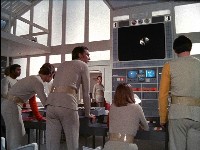
Penfold states There's no science in this episode. No-one could possibly survive the experience this purports them to. Like Genesis, this is an allegory.
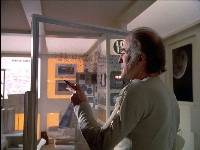
Penfold thought this was a "terrific episode for Victor Bergman." He stressed that although George Bellak left the show before filming started, he had established the characters, and in particular Victor Bergman. Penfold explained: "There's a line later in the episode where Barry says 'I'm a scientist, not a philosopher'. But of course in this episode, and throughout series one, he is both. That's very much what we wanted to achieve. We wanted to deal with issues to do with the condition of man, to do with man's position in the universe. Metaphysical questions. A lot of that is dealt with through the character of Victor Bergman."
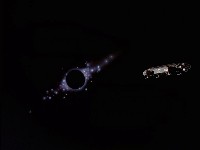
On the episode title "Black Sun", when the astronomical object is a black hole: "Disappearing into black hole was what we didn't want the entire series to do. Titling an episode "the Black Hole" wasn't entirely auspicious."
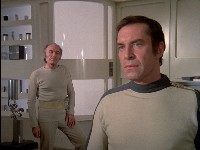
On director Lee Katzin: "Having spent the budget on episode 1, it was his job to make the best of what we could do in the Black Sun. To my mind, he did a pretty damn good job. This is an episode that depends on the performances of the actors. I think Lee Katzin got terrific performances out of both Barry Morse and Martin Landau in this episode."
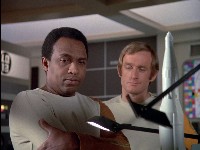
On actor Nick Tate (Alan Carter): "This was the second time that Nick and I had worked together. We both got our start in television drama in Sydney. My first job as a script editor was working on a series that Nick starred in, his first break. It was called My Brother Jack."
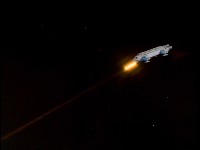
On Alphan weapons: "We really tried to downplay the military in the series. We had lots of discussions before we got underway about guns. We did end up with the stun gun. Mine and George's whole approach that was a non-military operation, a research establishment. We were about science rather than space militarism."
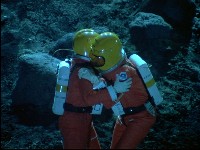
On producer Sylvia Anderson: "Sylvia was the producer, and the first port of call for anybody who had a problem, particularly the cast. The actors very much felt that their friend in the production was Sylvia. She's very good at putting actors' nerves at rest."
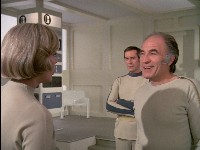
On stars Martin Landau and Barbara Bain: "I spent a lot of time with both Martin and Barbara. The money came late, and we started the scripting process far too late. Most nights I'd go back to Martin and Barbara's house in Little Venice, and we'd spent long into the evening going through one aspect or another of the next script. Martin was very keen to ensure he did have the lion's share of the screen, but I think it worked out very much in the series' favour that it did."
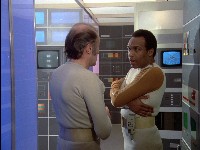
On computer: "I suppose HAL of 2001 hovered in the background. The idea that Victor Bergman is one step ahead of the computer all the time. Not to the extent that 2001's HAL becomes proactive. We did think in terms of the computer being a character. The way that the character was expressed in the show was through Kano."
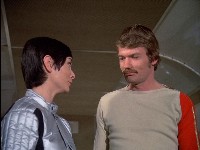
On multi-episode relationships: "Developing human stories within Alpha was tricky. When we made this show, it was carted around from station to station on 2 inch video tape. Apart from the first episode there was no guarantee what order episodes would be transmitted. The writers were completely constrained by that, developing a relationship over a number of episodes was something you just couldn't do. But we just touched it lightly in the relationship between Paul Morrow and Sandra Benes."
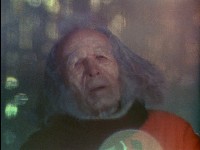
Inside the black sun: "One of my daughters now runs a post production house specializing in computer effects. (laughs) We had none of that! I think the kind of things that Lee Katzin managed to get on the screen to indicate the kind of things we were trying to get across in the script, I think it was amazingly good."
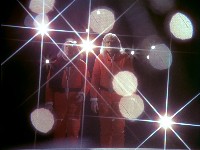
On the voice in the Black Sun: "I never had any intention that what we were talking about was actually God. This episode plays a little bit with themes I used again in Space Brain and War Games. The microbiologist might spend time looking at the micro-organism. The idea that there might be alien microbiologists putting the human species under some kind of microscope was the driving notion behind the female voice."
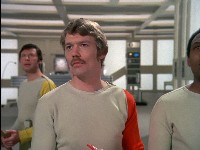
On the music: "Let me just say what a huge contribution Barry Gray's music makes. The way he plays the apprehension and hope, the rise and fall of emotions, Barry did a terrific job."
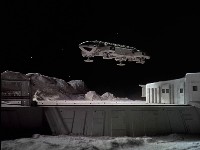
On the return of the Eagle: "There's no possible scientific explanation for the safe passage of the lifeboat to the other side of the universe, without going through the black hole. The whole thing was nothing more than allegorical."
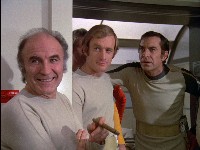
On actors improvising: "The actors had to stick to the script, because of the implications of going off script, adjusting other scenes and so on. We were responsive throughout to listening to our actors, what they had to say about their characters. We had endless conversations with them about that. For me, it was always very interesting to hear Nick say "I wouldn't do that". So what would you do? That was good to listen to and then feedback into the scripts."
Copyright Martin Willey